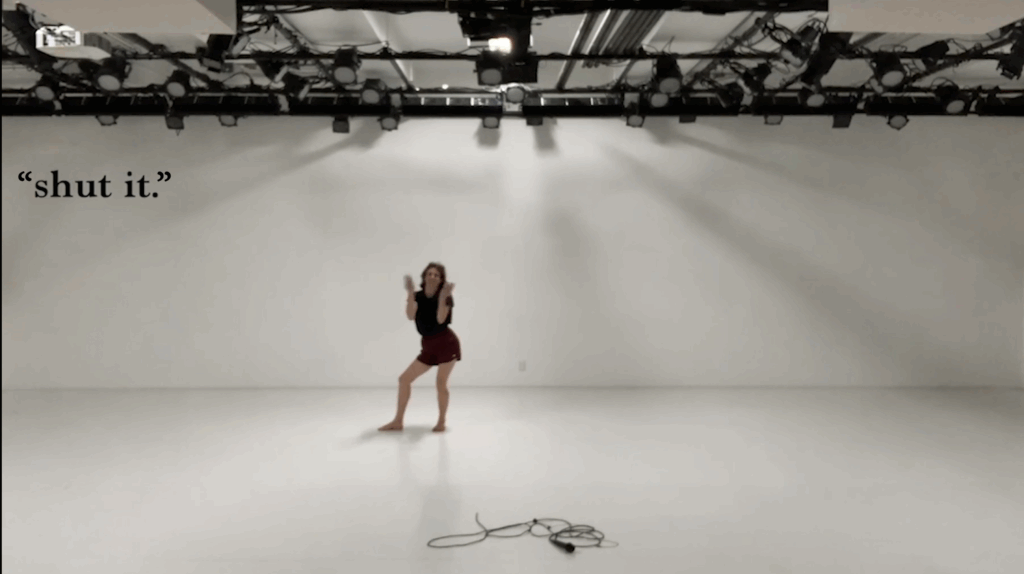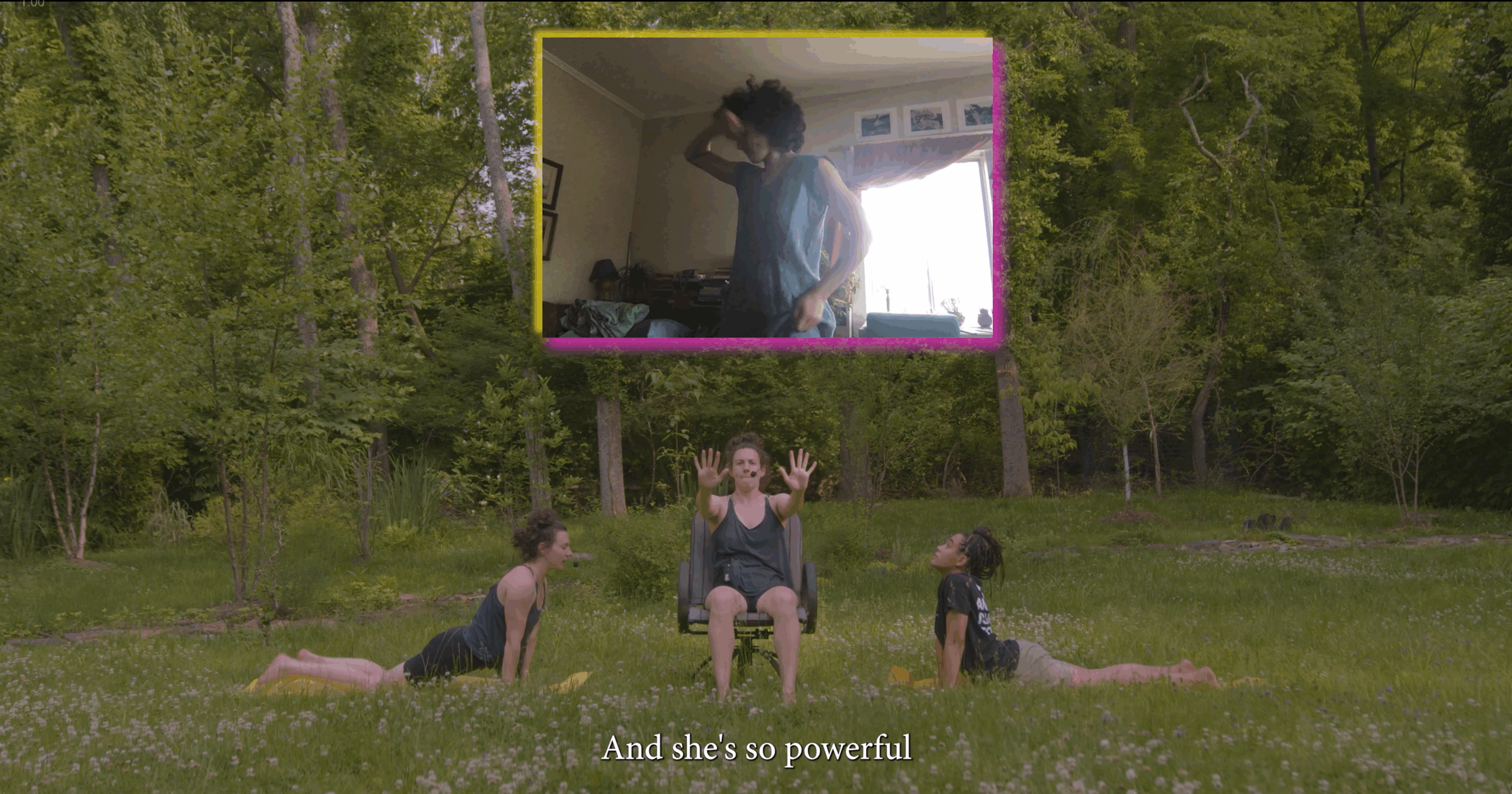When we have HD cameras in our pockets at all times and a dozen platforms on which to distribute whatever footage we choose to film, it’s easy to use filmed footage — once so expensive and limiting to create — to tell whatever kind of stories we want. The era of cheap and abundant digital cameras has birthed new genres (vlogs, video essays, instructional clips, micro-sketches, etc.) that can be accessed and created whenever our heart calls. For an avid creator and experimenter like Miriam Gabriel, this has a side effect: Our creations become journals, glimpses into the arcs our lives take and our ever-shifting spirits.
This is one of the ideas probed by Gabriel’s touching experimental, autobiographical short Verbal Diarrhea, a self-proclaimed “musing on a career transition,” set across several years. The film opens with a pandemic-set exercise video with Gabriel and her frequent collaborator Zora Schiltz-Rouse teaching the audience some yoga-style strength-building moves in the outdoors. As she talks the viewers through the exercises, she slips into reflective monologue about why she’s making these videos, what it says about her life: her lifelong pursuits, her relationship with her body and physical activity, teaching as an outlet, and how she communicates. She considers her dream of becoming a dancer as a “journey,” something she thought deeply about when the world shut down during COVID.

Following the exercise video clip, shot transforms: a picture-in-picture view of an exercise morphs into a 2019 (pre-pademic) video of Gabriel. We’re working backwards, unstuck in time. In this clip, Gabriel is visibly going through a meltdown as she dances for the camera. In narration, she describes a low point of her life: her experience working in a restaurant with cushy, “bitchy” celebrities as customers, their wealth stinging when she could barely scrape by. She describes a therapist who didn’t quite understand her but planted a powerful idea her brain: teaching. We’ve since seen her teaching instincts in a small way with the opening exercise video.
The short continues and Gabriel gets more emotionally naked (and, for a brief shot, physically naked). She describes a lack of control and the contradictory, dehumanizing pressures coming from all sides: failed auditions, uncaring managers, etc. It’s all connected, but how? Then a knife twist — Gabriel recounts a sexual assault from a coworker, described almost haphazardly. As a result, she left her job, abandoned her entire career in food service, rather than share a space with her abuser. Given the disgusting images and associations with assault she describes; we can’t blame her.
As she shares this memory, she notes that this experience was the impetus for her to pursue a career change and go into teaching. She works with children now — per her web site, she runs a dance program for 400+ elementary schoolers in Queens. She shares how the students have become one of the focuses of her life. This short ties back to the opening, of her teaching the audience how to control and strengthen their bodies, just as she teaches the students’, just as she does for her own. The various clips, shot at different times and places and for different purposes, create a collage of a person in transition and adjusting to the unfairness life has handed her (and, by proxy, so many other people). Whether or not Gabriel is thriving (and the short suggests the matter is complicated), she is harnessing all of this.

Gabriel is a wonderful, expressive dancer. Nearly all the shots in the short are of her dancing in different styles with various emotional timbres. That physical artistry gives the short a compulsive, kinetic energy across its punchy, well-edited seven minutes. Gabriel is always in graceful control of her moves, as sharp contrast to her monologues (and, sometimes, her facial expressions) sharing a very different story, one of a life that she has often struggled to control.
The phrase “verbal diarrhea” as a title is good warning for just how dense and stream-of-consciousness the narration is. The copy of the film on both NoBudge and YouTube has subtitles attached to the film, and they’re running on-screen for essentially the entire duration. Abdulaziz “Zezo” AlAttas provides the clean, steady sound mixing. The words keep flowing, almost uncontrolled, even when they’re uncomfortable. It’s a little bit like the feeling of your insides when… well, you read the title.
Any experimental or non-narrative film is going to provide value in proportion to your openness, to what you’re willing to bring to it and look for in it. Perhaps what I took away from Verbal Diarrhea is totally different from what Gabriel, Schiltz-Rouse, and cinematographer Sophia de Baun envisioned when they assembled it. But I’m glad she shared her journey with us; if nothing else, it’s a touching glimpse into the challenges of building your life around the creative process and the dark, complicated ripples of cruelty like sexual abuse. Verbal Diarrhea is a provocative, fascinating lens into Miriam Gabriel’s life.
Verbal Diarrhea (7 min) is streaming on NoBudge and Youtube
Miriam Gabriel is a dancer, filmmaker, and teacher. Her narrative works include Filling Holes and Out There. You can find her website here.
Verbal Diarrhea is created by Miriam Gabriel. It stars Miriam Gabriel and Zora Schiltz-Rouse. Crew credits include Zora Schiltz-Rouse as dramaturge, Sophia de Baun as cinematographer, and Abdulaziz “Zezo” AlAttas for sound mixing.
Dan Stalcup is the film critic for The New Cinephile and The Goods. Reach him at dan.stalcup@gmail.com.
